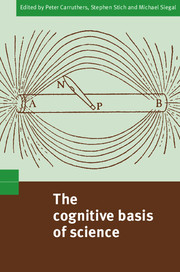Book contents
- Frontmatter
- Contents
- List of contributors
- Preface
- 1 Introduction: what makes science possible?
- Part one Science and innateness
- Part two Science and cognition
- 5 Science without grammar: scientific reasoning in severe agrammatic aphasia
- 6 Causal maps and Bayes nets: a cognitive and computational account of theory-formation
- 7 The cognitive basis of model-based reasoning in science
- 8 Understanding the role of cognition in science: the Science as Category framework
- 9 Theorizing is important, and collateral information constrains how well it is done
- 10 The influence of prior belief on scientific thinking
- 11 Thinking about causality: pragmatic, social and scientific rationality
- Part three Science and motivation
- Part four Science and the social
- References
- Author index
- Subject index
8 - Understanding the role of cognition in science: the Science as Category framework
Published online by Cambridge University Press: 23 November 2009
- Frontmatter
- Contents
- List of contributors
- Preface
- 1 Introduction: what makes science possible?
- Part one Science and innateness
- Part two Science and cognition
- 5 Science without grammar: scientific reasoning in severe agrammatic aphasia
- 6 Causal maps and Bayes nets: a cognitive and computational account of theory-formation
- 7 The cognitive basis of model-based reasoning in science
- 8 Understanding the role of cognition in science: the Science as Category framework
- 9 Theorizing is important, and collateral information constrains how well it is done
- 10 The influence of prior belief on scientific thinking
- 11 Thinking about causality: pragmatic, social and scientific rationality
- Part three Science and motivation
- Part four Science and the social
- References
- Author index
- Subject index
Summary
Scientists, philosophers, cognitive scientists, sociologists and journalists have often pondered over the nature of science and attempted to identify the cognitive strategies and procedures that scientists use in making discoveries. One thing that is clear from looking at science from this multiplicity of perspectives is that while many have argued for one simple cognitive procedure that characterizes science, this is fraught with problems. The goal of having a simple definition of science has now all but vanished from contemporary accounts of science. Following T. S. Kuhn's The Structure of Scientific Revolutions (1962) there has been a shift to a more contextually grounded account of science. In this chapter, I will show that recent research in cognitive science points to a new way of conceptualizing scientific thinking that shows what mental procedures scientists use and provides insights into the cognitive underpinnings of science and the scientific mind. I will first provide an overview of some of our recent findings on what it is that scientists do while they conduct their research. Then I will introduce the Science as Category framework, and discuss the implications of this framework for cognitive models of science and human development.
Understanding science and the scientific mind: how do we do it?
Over the past hundred years there have been many efforts to provide a unified account of science. Interestingly, many of these accounts have placed at their core a cognitive activity such as induction or deduction.
- Type
- Chapter
- Information
- The Cognitive Basis of Science , pp. 154 - 170Publisher: Cambridge University PressPrint publication year: 2002
- 12
- Cited by



